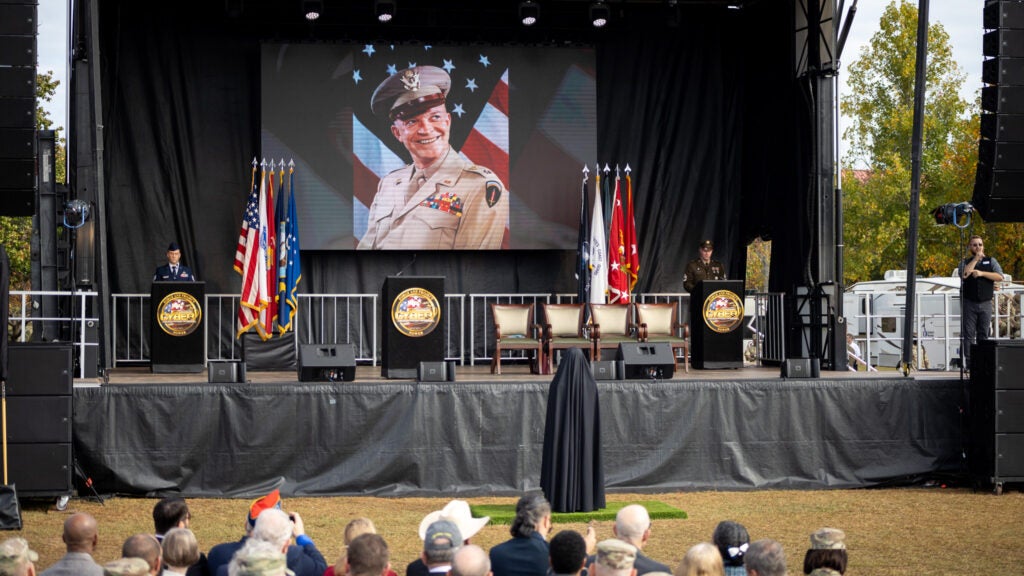Fort Gordon is now Fort Eisenhower, renamed for a man whose military leadership and forward thinking helped make the post what it is today, Army officials said.
The Friday redesignation in honor of Gen. Dwight David Eisenhower, the 34th U.S. president, marked the Naming Commission’s final step in its mission, Retired Navy Adm. Michelle Howard said at a brief public discussion.
Howard called Friday, the ninth and final redesignation of U.S. Army bases named for Confederate generals, the “cherry on top” of the commission’s efforts.
READ MORE: PHOTOJOURNALISM: Fort Eisenhower redesignation ceremony
The morning ceremony was full of remembrances of Eisenhower, who frequented Augusta during his two terms as president, as well as recognitions of his advancement of technology and civil rights. The Fort Gordon flag was cased, the new Fort Eisenhower colors were uncased and a bust of Eisenhower was unveiled. Eisenhower’s granddaughter, Susan Eisenhower, Army Secretary Christine Wormuth, and post Commanding Maj. Gen. Paul Stanton each spoke at the ceremony.
In Augusta, the community had immediately suggested and embraced the honor for its favorite presidential visitor, Howard said.
“They said ‘look, you didn’t give us this name, but we’re taking it,’” she said. “I have never seen a group so aligned.”
Among Eisenhower’s accomplishments, for Navy veterans “D-Day stands out as the milestone archetype,” Howard said. And “as an African-American, I can tell you this man was the commander in chief of his men and to uphold the decision to integrate schools just resonates with me.”
At the ceremony, Stanton said Eisenhower held his last formation before retiring in 1961 at the site of the ceremony, Barton Field. Eisenhower told the Fort Gordon troops of his admiration for them, he said.

“Gen. Eisenhower, sir, here we are on the same field where it thrills our hearts to commemorate your legacy. Fort Eisenhower will forever be associated with an incredible soldier, statesmen, visionary and world leader,” Stanton said.
Eisenhower and his wife, Mamie, lived a military life. “Thirty-three moves in his career,” sometimes to posts with no family housing, he said.
Eisenhower’s embrace of innovation and improvement, from tanks to highways to computers, laid the groundwork for the post’s success today, and his name aligns with its mission, he said.
“We are now Fort Eisenhower, an inspiring name that underscores the role this installation plays as a cyber power projection platform on a world stage. Gen. Eisenhower dedicated his life to global impact,” Stanton said.
Eisenhower’s name appears on streets and buildings nationwide, but until Friday, not on an Army post, Stanton said.
“As he rests eternal with five stars on his shoulders, the Army now honors this soldier for life,” he said.

Susan Eisenhower, a policy analyst focused on national security who has written extensively about her family, said her grandparents recognized the need to recharge.
“In this context, Augusta and the state of Georgia provided considerable respite for them,” she said. “My grandfather knew that he must sometimes allow his brain to rest, so that it could process the complex factors of critical decision-making. Hunting, golf and oil painting were indispensable parts of that reset.”
As president, he had more critical decisions to make, including “the advent of the hydrogen bomb and the dawn of the space age, which he shaped to assure free access to this uncharted medium,” she said.
During his two terms, Eisenhower balanced the budget three times and came close another two, leaving his successor with a surplus, she said.
“He brought innovation to our national security apparatus, built the Interstate Highway System and championed civil rights. He was perhaps the most non-partisan president of the 20th century,” she said.
Eisenhower said her grandfather rarely thought of his own honors and that his deathbed wishes were entirely about others.
“He would be very humbled by the fact that the community has suggested his name and he would be extremely pleased that a post like this one that is so central to the future security of our country is named in his honor,” she said.
“But he would be thinking about the people who are working here. I can tell you that that’s just the way he was.”
Wormuth, who toured aging and newer barracks on post later Friday, said the post “truly embodies our commitment to operating the most technologically sophisticated Army in the world,” with Army Cyber at the forefront.
As global threats evolve, Fort Eisenhower is key to the Army’s readiness, she said.
“Because for the U.S. Army, the future is our focus. We must continue to look ahead to the challenges and opportunities of tomorrow,” she said.
The name change doesn’t mean the service given over the last 80 years is forgotten, Wormuth said.
“Instead, it signifies that we are embracing the future before us, honoring one of our nation’s most storied leaders and sending a clear signal of the Army we want to be and the values that make us who we are,” she said.












